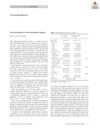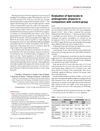 4 citations,
May 2019 in “Biology open”
4 citations,
May 2019 in “Biology open” Testosterone reduces heart damage and inflammation after injury.
 December 2017 in “Revista Brasileira de Saúde Materno Infantil”
December 2017 in “Revista Brasileira de Saúde Materno Infantil” Pregnant women with Systemic Lupus Erythematosus have a higher risk of blood clotting problems.
 33 citations,
November 2012 in “Journal of The American Academy of Dermatology”
33 citations,
November 2012 in “Journal of The American Academy of Dermatology” FPHL common in Taiwanese women; risk factors include BMI, high glucose, early puberty, fewer childbirths, oral contraceptives, and UV exposure.
29 citations,
October 2020 in “Environmental health perspectives” Five preservatives may disrupt hormone function and need more health and environmental risk assessment.
 33 citations,
August 2006 in “Journal der Deutschen Dermatologischen Gesellschaft”
33 citations,
August 2006 in “Journal der Deutschen Dermatologischen Gesellschaft” Pregnancy can cause specific skin conditions that need correct diagnosis and treatment to protect both mother and baby.
219 citations,
January 2006 in “Drug Metabolism Reviews” DHEA affects multiple receptors and may help with metabolic issues, but its safety and effectiveness in humans are unclear.
 18 citations,
July 2022 in “Frontiers in Immunology”
18 citations,
July 2022 in “Frontiers in Immunology” Volatile organic compounds can cause inflammation and increase the risk of autoimmune diseases.
 16 citations,
October 2007 in “Andrologia”
16 citations,
October 2007 in “Andrologia” DHT is a strong androgen that may pose less risk to the prostate compared to testosterone.
306 citations,
August 2011 in “Journal of cachexia, sarcopenia and muscle” Enobosarm significantly increased muscle mass and improved physical function in elderly men and postmenopausal women without serious side effects.

Cold-pressed rapeseed oil is most resistant to oxidation and certain oils may reduce chronic disease risk; consumers like the taste of pumpkin oil best.
 18 citations,
August 2019 in “Nutrients”
18 citations,
August 2019 in “Nutrients” Eating barley for life may lead to healthier aging in mice.
 2 citations,
November 2018 in “Clinical and Experimental Dermatology”
2 citations,
November 2018 in “Clinical and Experimental Dermatology” Acne is more common in men with male pattern baldness due to increased hormone levels.
 97 citations,
October 2019 in “Journal of Translational Medicine”
97 citations,
October 2019 in “Journal of Translational Medicine” A very low-calorie ketogenic diet is effective for quick weight loss and improving health in obese patients, with careful management of side effects and maintenance.
 27 citations,
January 2009 in “Journal of The European Academy of Dermatology and Venereology”
27 citations,
January 2009 in “Journal of The European Academy of Dermatology and Venereology” Men with a certain type of hair loss (AGA) have higher bad cholesterol and lower good cholesterol levels, making them more likely to get heart disease.
 105 citations,
February 2011 in “The Journal of Clinical Endocrinology & Metabolism”
105 citations,
February 2011 in “The Journal of Clinical Endocrinology & Metabolism” Treating sleep apnea in young obese women with PCOS can improve heart health and insulin sensitivity.
 3 citations,
August 2017 in “International journal of reproduction, contraception, obstetrics and gynecology”
3 citations,
August 2017 in “International journal of reproduction, contraception, obstetrics and gynecology” People with PCOS have higher levels of PAI-1, which may increase their risk of heart disease and fertility issues.
 December 2023 in “Frontiers in endocrinology”
December 2023 in “Frontiers in endocrinology” Excess androgens may cause PCOS, not just be a symptom.
17 citations,
January 2020 in “The World Journal of Men's Health” Long-term use of finasteride and dutasteride can cause serious health issues like diabetes and liver problems.
 1 citations,
July 2022 in “International journal of homoeopathic sciences”
1 citations,
July 2022 in “International journal of homoeopathic sciences” Homoeopathic treatment may help manage polycystic ovarian syndrome.
 25 citations,
January 2013 in “International Journal of Trichology”
25 citations,
January 2013 in “International Journal of Trichology” Premature balding in some men may be linked to altered hormones, but it's not the male equivalent to polycystic ovary syndrome or metabolic syndrome.
 39 citations,
September 2012 in “Human Reproduction”
39 citations,
September 2012 in “Human Reproduction” Certain genetic variations in the SHBG gene are linked to an increased or decreased risk of PCOS in Mediterranean women.
 10 citations,
January 2015 in “Przeglad Menopauzalny”
10 citations,
January 2015 in “Przeglad Menopauzalny” Progestogens are essential in menopausal hormone therapy to prevent uterine cancer and must be chosen carefully based on individual needs.
 12 citations,
January 2010 in “Pediatric Health”
12 citations,
January 2010 in “Pediatric Health” Early treatment and lifestyle changes are important for managing PCOS in young people to prevent long-term health issues.
 8 citations,
December 1981 in “Journal of The American Academy of Dermatology”
8 citations,
December 1981 in “Journal of The American Academy of Dermatology” The document concludes that parathyroid diseases have a range of clinical features and outcomes, with some conditions being treatable and others having a high risk of mortality.
 November 2004 in “John Wiley & Sons, Ltd eBooks”
November 2004 in “John Wiley & Sons, Ltd eBooks” Insulin resistance is linked to PCOS and can lead to other health issues, but treatments like metformin can help manage symptoms.
17 citations,
May 2014 in “Cell transplantation” Genetically modified stem cells from human hair follicles can lower blood sugar and increase survival in diabetic mice.
 9 citations,
May 2021 in “Frontiers in Cell and Developmental Biology”
9 citations,
May 2021 in “Frontiers in Cell and Developmental Biology” DNA methylation changes in women with PCOS could be used as disease markers and suggest new treatment targets.
 57 citations,
January 1995 in “The American journal of medicine”
57 citations,
January 1995 in “The American journal of medicine” Oral contraceptives help treat hyperandrogenic disorders, improving symptoms like excessive hair and acne.
1 citations,
November 2023 in “Biomedicines” Menopause can cause hair thinning and texture changes due to hormonal and metabolic shifts.
63 citations,
September 2020 in “Frontiers in Microbiology” Probiotics show promise for health benefits but need more research to understand how they work.























